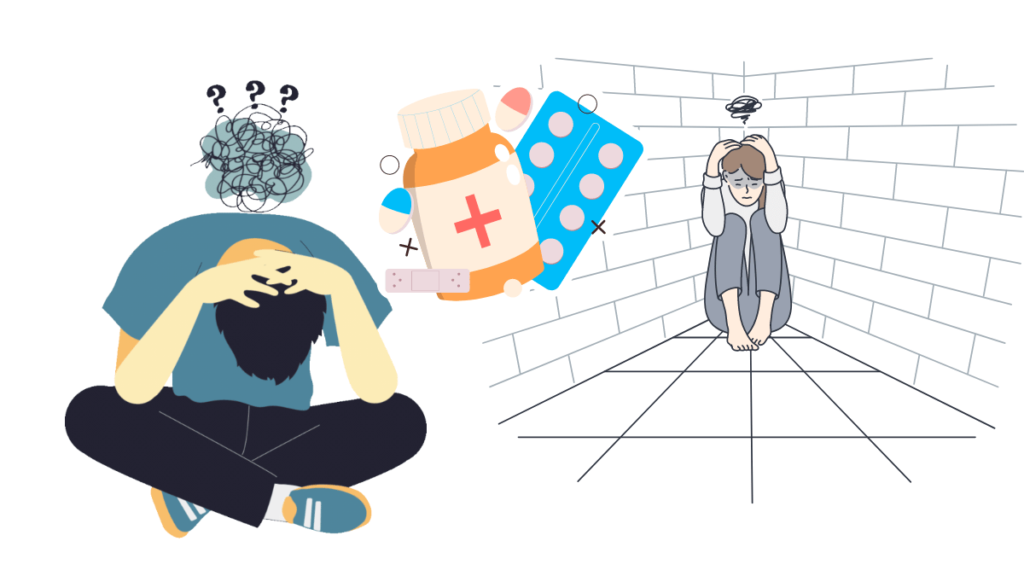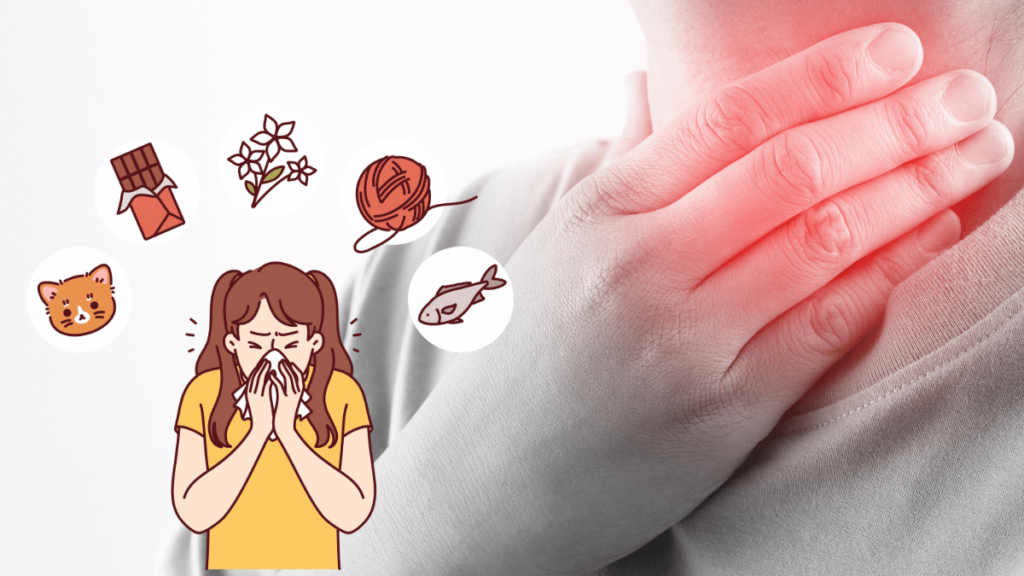Why Medication is Prescribed for Anxiety and Depression
Medication for anxiety and depression is prescribed because these conditions often involve chemical imbalances in the brain that can affect mood, thoughts, and behavior. Here’s a bit more detail on why and how medications can be helpful:
- Chemical Imbalances: Both anxiety and depression are linked to imbalances in neurotransmitters, which are chemicals in the brain that help regulate mood and emotional responses. Medications can help correct these imbalances.
Types of Medications:
- Antidepressants: These include selective serotonin reuptake inhibitors (SSRIs) and serotonin-norepinephrine reuptake inhibitors (SNRIs), which work by increasing the levels of certain neurotransmitters like serotonin and norepinephrine. This can help improve mood and reduce feelings of depression.
- Anxiolytics: These medications, such as benzodiazepines, work to reduce anxiety by affecting neurotransmitters that calm the brain. However, they’re typically used for short-term relief due to the risk of dependence.
- Beta-Blockers: Sometimes used for anxiety, especially when it causes physical symptoms like a racing heart, beta-blockers can help manage these symptoms by affecting how the body responds to stress.
- Effectiveness: Medications can help alleviate symptoms and improve quality of life, making it easier for individuals to engage in therapy and other treatments. They can be particularly beneficial when symptoms are severe or do not respond to other interventions like therapy alone.
- Personalization: Finding the right medication often involves a trial-and-error process, as different individuals respond differently to various drugs. What works well for one person might not work for another, and sometimes it takes time to find the most effective treatment.
- Complementary to Therapy: Medication is often used in conjunction with psychotherapy (talk therapy). While medication addresses the biological aspects of anxiety and depression, therapy helps individuals understand and manage their thoughts and behaviors, providing a comprehensive approach to treatment.
Types of Prescription Medications for Anxiety

Prescription medications for anxiety come in several different categories, each serving a specific role in managing symptoms.
Selective Serotonin Reuptake Inhibitors (SSRIs) are often the first line of treatment for anxiety. They work by increasing the levels of serotonin in the brain, a neurotransmitter that helps regulate mood. By enhancing serotonin activity, SSRIs can help reduce feelings of anxiety and improve overall mood. Common examples include sertraline, fluoxetine, and escitalopram.
Serotonin-Norepinephrine Reuptake Inhibitors (SNRIs) function similarly to SSRIs but also target norepinephrine, another neurotransmitter involved in mood regulation. By increasing the availability of both serotonin and norepinephrine, SNRIs can help alleviate anxiety symptoms. Medications like venlafaxine and duloxetine fall into this category.
Benzodiazepines are another class of medication used to treat anxiety, especially for short-term relief. They work by enhancing the effect of a neurotransmitter called gamma-aminobutyric acid (GABA), which has a calming effect on the brain. This makes them effective at quickly reducing anxiety symptoms. However, due to their potential for dependence and tolerance, they are generally prescribed for short durations. Common benzodiazepines include diazepam, lorazepam, and alprazolam.
Buspirone is another medication prescribed for anxiety that is distinct from SSRIs and benzodiazepines. It works on serotonin receptors but has a different mechanism of action. It tends to have a lower risk of dependency compared to benzodiazepines and can be a good option for those who don’t tolerate other medications well or need long-term management.
In addition to these, there are other medications sometimes used for anxiety, depending on individual needs and treatment goals. For instance, certain beta-blockers like propranolol may be prescribed to manage the physical symptoms of anxiety, such as a rapid heartbeat or shaking. Additionally, antihistamines like hydroxyzine can be used for short-term relief due to their sedative properties.
Types of Prescription Medications for Depression
Antidepressants: SSRIs (Selective Serotonin Reuptake Inhibitors) are commonly prescribed for depression. They work by increasing the levels of serotonin in the brain, which can help improve mood and reduce symptoms of depression. Popular SSRIs include sertraline, fluoxetine, and escitalopram.
Antidepressants: SNRIs (Serotonin-Norepinephrine Reuptake Inhibitors) are another class that increases both serotonin and norepinephrine levels. This dual action can help alleviate symptoms of depression and is particularly useful for individuals who do not respond to SSRIs. Examples of SNRIs include venlafaxine and duloxetine.
Tricyclic Antidepressants (TCAs) were among the first antidepressants developed. They work by increasing levels of neurotransmitters like norepinephrine and serotonin, but they also affect other neurotransmitters, which can lead to more side effects. Common TCAs include amitriptyline and nortriptyline.
Monoamine Oxidase Inhibitors (MAOIs) are older antidepressants that work by inhibiting the enzyme monoamine oxidase, which breaks down neurotransmitters like serotonin and norepinephrine. This leads to increased levels of these neurotransmitters in the brain. Examples include phenelzine and tranylcypromine. MAOIs can have significant dietary and drug interactions, so they are less commonly prescribed today.
Atypical Antidepressants include a range of drugs with unique mechanisms of action that don’t fit neatly into the categories above. They work on various neurotransmitters and have different side effect profiles. Examples include bupropion, which affects norepinephrine and dopamine, and mirtazapine, which influences serotonin and norepinephrine.
How Prescription Medications for Anxiety and Depression Work
Mechanism of Action for Anxiety Medications
Medications for anxiety primarily target neurotransmitters to help modulate the brain’s response to stress and anxiety. SSRIs and SNRIs increase serotonin and, in the case of SNRIs, norepinephrine, which can help stabilize mood and reduce anxiety. Benzodiazepines enhance the action of GABA, a neurotransmitter that produces a calming effect, leading to immediate relief of anxiety symptoms. Buspirone works differently by acting on serotonin receptors but is slower to take effect and is less likely to cause dependence.
Mechanism of Action for Depression Medications
Antidepressants generally work by altering the levels of neurotransmitters involved in mood regulation. SSRIs increase serotonin levels by preventing its reuptake into the brain’s nerve cells. SNRIs increase both serotonin and norepinephrine levels. TCAs also boost neurotransmitter levels but affect a broader range of neurotransmitters, which can lead to more side effects. MAOIs inhibit the enzyme that breaks down neurotransmitters, thereby increasing their levels. Atypical antidepressants have varied mechanisms, such as affecting dopamine and norepinephrine or serotonin in different ways.

Choosing the Right Medication for Anxiety and Depression
Factors to Consider
Choosing the right medication involves assessing the specific symptoms, potential side effects, and individual health conditions. Factors include the severity of symptoms, history of medication responses, side effect profiles, and any concurrent health issues or medications that might interact.
Working with Your Healthcare Provider
Collaborating with your healthcare provider is crucial for finding the most effective medication. They will consider your medical history, current health status, and personal preferences to tailor a treatment plan. This might involve trying different medications or adjusting dosages to find the best fit.
Personalization of Treatment
Personalized treatment takes into account the unique aspects of each individual’s condition and response to medication. This means not only choosing the right medication but also monitoring its effectiveness and adjusting as needed based on how well it works and any side effects experienced.
Potential Side Effects and Risks of Prescription Medications
Common Side Effects
Common side effects can include nausea, fatigue, weight changes, dry mouth, and dizziness. For anxiety medications, particularly benzodiazepines, side effects might include drowsiness, coordination issues, and potential for dependency. For antidepressants, side effects can include gastrointestinal disturbances, sexual dysfunction, and insomnia.
Serious Side Effects
Serious side effects, while less common, can include severe allergic reactions, suicidal thoughts (particularly in young adults), and serotonin syndrome (a potentially life-threatening condition caused by excessive serotonin). MAOIs can cause hypertensive crises when combined with certain foods or other medications.
Managing and Mitigating Risks
To manage risks, it’s important to have regular follow-ups with your healthcare provider, report any unusual or severe side effects immediately, and adhere to prescribed dosages. Your provider may adjust your treatment plan based on your response and any side effects.
Combining Medications with Other Therapies
Therapy and Counseling
Combining medication with therapy, such as cognitive-behavioral therapy (CBT), can be highly effective. Therapy helps individuals address the underlying thought patterns and behaviors contributing to their anxiety or depression, providing a comprehensive approach to treatment.
Lifestyle Changes and Self-Care
Incorporating lifestyle changes such as regular exercise, healthy eating, and adequate sleep can enhance the effectiveness of medication. Stress management techniques, mindfulness, and relaxation exercises can also complement pharmacological treatments.
Alternative and Complementary Approaches
Conclusion
Some individuals find benefit in alternative therapies such as acupuncture, meditation, or herbal supplements. However, it’s important to discuss these approaches with your healthcare provider to ensure they do not interact negatively with prescribed medications or affect treatment outcomes.
In summary, managing anxiety and depression often involves a multifaceted approach that includes both medication and non-medication therapies. Prescription medications can play a crucial role in stabilizing mood and reducing symptoms by targeting neurotransmitters in the brain. SSRIs and SNRIs are commonly used for their ability to enhance serotonin and norepinephrine levels, while benzodiazepines and buspirone offer different mechanisms for managing anxiety. Tricyclic antidepressants, MAOIs, and atypical antidepressants provide additional options, each with unique benefits and potential side effects.
Choosing the right medication requires careful consideration of various factors, including the specific symptoms, individual health conditions, and potential side effects. Close collaboration with a healthcare provider ensures that treatment is tailored to personal needs and adjusted as necessary.


